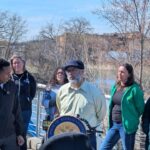Recently, the Bronx River Alliance board of directors unanimously voted to endorse New Yorkers for Parks (NY4P) 2013 Parks Platform. NY4P urges mayoral and other NYC candidates to sign on to this platform, and to commit to making the city’s Parks Department stronger and more effective in the years ahead. The platform addresses various issues including funding, maintenance, transparency, capital processes, parkland preservation, and greater cooperation among City departments and communities.
If you’re reading this, you want to make parks a priority, and you agree with Parks Platform 2013, you’re encouraged to sign a brief on-line petition. It only takes a minute, and it can make a big difference. Go to the petition right now.
Below are the 10 basic tenets of the platform. Please see the full text of Parks Platform 2013 at NY4P website.
We call on the next Mayor and Administration to:
OVERHAUL HOW THE PARKS DEPARTMENT IS FUNDED.
1) The Parks Department should have its own discretionary capital budget.
2) The Parks Department’s maintenance budget should be increased, and funding for core functions should be baselined – meaning automatically renewed – in its annual expense budget.
3) The Parks Department provides an essential city service and should be staffed accordingly.
INCREASE THE TRANSPARENCY AND EFFICIENCY OF THE PARKS DEPARTMENT TO ENSURE EQUITABLE DISTRIBUTION OF RESOURCES.
4) The Parks Department should know the cost to maintain every City park, as well as the amount of public and private funding that supports each.
5) The Parks Department should adopt the best practices of other capital projects agencies to improve its own process.
6) Organizations in public-private partnerships with the Parks Department should report annual revenues, expenses and other critical financial information in a simple, consistent manner to be shared on the Department’s website.
RESTRICT AND STRONGLY REGULATE THE PRIVATIZATION OF PARKLAND.
7) Parkland alienation should not occur unless no other land is available to serve an essential public need.
8) State and local laws regulating parkland alienation should be strengthened to require earlier and broader notification of alienation actions, and to mandate acre-for-acre replacement of lost parkland.
INTEGRATE PARKS PLANNING INTO NEIGHBORHOOD, CITYWIDE AND RESILIENCY PLANNING.
9) Parks are part of a broad network of public spaces, and City agencies should collaborate to maximize neighborhood open space and citywide environmental benefits.
10) The City should be more proactive in involving neighborhood residents in their parks, both as volunteer stewards and in planning for the future.
Read the full platform here and the accompanying white paper here.






